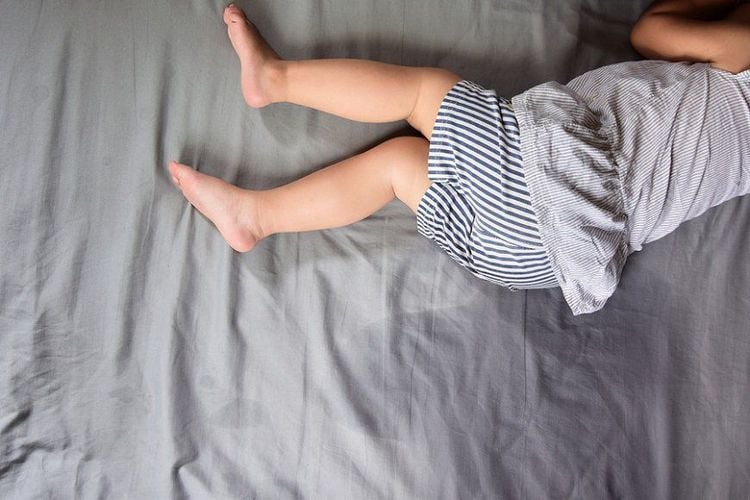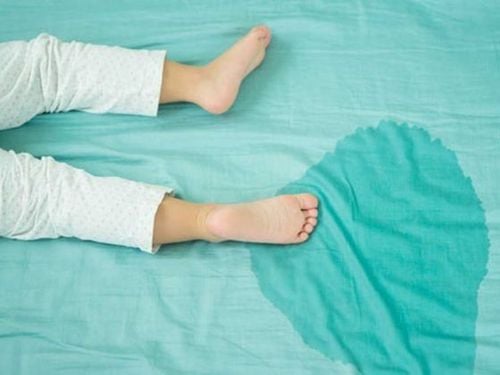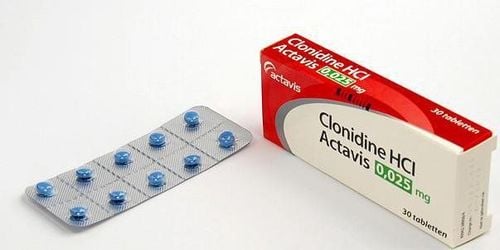This is an automatically translated article.
Bedwetting is common: 10% to 15% of 5-year-olds and 6% to 8% of 8-year-olds wet the bed. A visit to the doctor can rule out any medical or psychological cause (especially if there are any major changes in a child's routine), but for most children it is simply problems at a developmental age. And while you're working on this, bed wetting can be a mental issue like stress for both kids and parents. In this article, we will provide helpful information for parents to understand how to effectively deal with the stress of bedwetting.
Good sleep is interrupted, blankets, mats have to be washed the next day, children are embarrassed, confident and feel guilty. That's all that can happen if your child is bedwetting. This is normal but can be stressful for all family members. Surely many mothers will feel extremely disappointed, even if on the surface they are still trying to appear to have nothing to encourage their children.
Children will stop bedwetting as soon as their bodies are ready to control their ability to urinate through reducing the amount of urine excreted each night or increasing the sensitivity of the nervous system Take the initiative to wake yourself up when you feel the urge to go to the bathroom every night. Until then, though, it's possible that tension continues in the family. And here are some ways to help reduce the stress that can happen to both children and their parents.

Ướt giường có thể là một vấn đề về mặt tinh thần đối với cả trẻ em và cha mẹ
1. How to reduce the need to wash clothes every time your child wets the bed?
If your child is bedwetting frequently (more than a few times per week) the easiest and most appropriate measure is to keep the baby in diapers or diapers overnight if they still fit well and don't leak out. Another option that works is washable or disposable underwear designed specifically for children who often wet the bed. Some models may also come with built-in desiccant pads. Some children sleep very deeply and refuse to wake up even after they have wet the bed and blankets.
In the event that your child just wets the bed occasionally and prefers to wear underwear, make things simpler by protecting his bed sheets and mattress with a washable waterproof pad or disposable. If moms are tired of frequent washing, a disposable waterproof mattress can be a reasonable choice.
Save the laundry until morning. If parents wake up to find their baby has wet the bed and clothes, just change into another dry set of pajamas and put the wet pajamas in the bathroom or washing machine afterwards. Spread a waterproof towel or pad over the wet part of the bed. This will help the child not to get cold, in addition, they will also prevent the sleep of both parents and children will not be too disrupted. Another option for children who often wet the bed is to cover the bed with several layers of sheets and waterproof pads. That way, parents can quickly remove the wet mattress every time their child wets the bed without having to make the bed again the next morning.
Another thing to keep in mind is that mothers should share the responsibility of handling wet blankets with both their husbands if he can. If your child wants to help, encourage him and show him how. However, don't take it as a punishment for your child. Politely thank your child for his help and let him know that you don't blame him at all for wetting the bed. This not only helps to bond family members, but also helps mothers reduce the burden of laundry, thereby relieving a part of the stress that gradually forms when the child wets the bed.

Cha mẹ có thể trải lên giường một vài lớp khăn trải giường hoặc đệm chống thấm
2. What to do not to vent anger on the child's head
Punishing or blaming children for their wetting the bed will in fact only bring about negative results. Parents need to always remind themselves that bed wetting is not intentional or intentional. Kids who wet the bed aren't lazy kids who won't get up at night to go to the bathroom. It is all due to the physiological development of the child.
Parents also try not to blame yourself. While bed wetting is not the fault of the child, it is not the fault of the child's parents either. It's not the result of parents potty training their kids or anything else they're used to. In most cases, it is a normal part of physical development and therefore cannot be rushed. Washable or disposable diapers, diapers or underwear designed for children to wet the bed overnight can be some of the easiest options to reduce the effects of bedwetting until when the child's body is ready to control its own nighttime urination.
If parents find themselves constantly upset about their child's bedwetting, consider whether they are getting enough rest. Try to talk this over with your child's partner or grandparents, have them look after and manage your child's bedwetting for a few nights while you try to get enough rest so you can recover physically. and mentally before continuing the long journey with the baby.
If the child's parents feel overwhelmed, talk to the doctor about the situation and what help is available to the young parent and their child. Doctors can suggest ways to manage your child's bedwetting to reduce stress. Doctors can also recommend treatments, such as a bed wetting alarm, or certain medications that can be used for temporary situations like traveling, oversleeping at a friend's house, relatives or summer camps....

Bác sĩ có thể đề xuất các phương pháp điều trị khi bố mẹ cảm thấy quá tải
For the vast majority of children, bedwetting is an inevitable part of their development. However, sometimes, parents don't accept that because they want to do something else to fix this situation for their child and also so that they can get a good night's sleep. There are ways for parents to make this period less stressful and more stressful for the whole family. But either way, try to let your child be as comfortable as possible and not live in guilt.
If it is not possible to improve bed-wetting in children with home remedies, parents should take the child to Vinmec International General Hospital for a diagnosis to determine the cause and treatment intervention. The leading urologists at Vinmec will perform the necessary examination methods to find out the cause of nocturia syndrome and give the most effective treatment advice to help children return to normal activities soon. normal.
If you have a need for medical examination at Vimec Health System nationwide, please make an appointment on the website to be served.
Please dial HOTLINE for more information or register for an appointment HERE. Download MyVinmec app to make appointments faster and to manage your bookings easily.
References: babycenter.com, todaysparent.com, webmd.com













